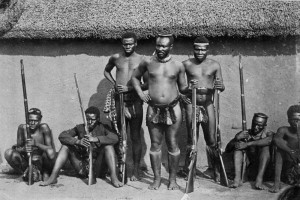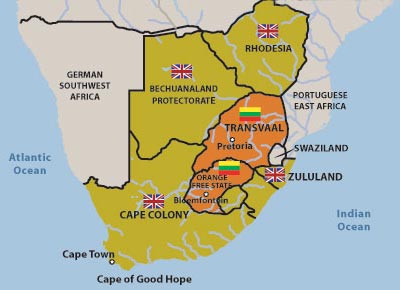ALBUM – view my Zululand album
TRANSITION CHART for the South Africa Area
Fast Facts
Region: Southern Africa
Group: South Africa Area
Classification: Colony (Britain)
Prior Regime: Zulu Kingdom
Key Dates:
1878, Dec 11 – Britain delivers an ultimatum to Zulu Kingdom to submit to British rule
1879, Jan – Britain attacks the Zulu Kingdom after their refusal to submit to British rule
1887, May 19 – Britain defeats the Zulu Kingdom and creates Zululand colony
1897, Dec 31 – Zululand annexed into Natal Colony
Following Regime: Natal, British Colony
Scott Catalogue: (Zululand) #1-24
Pick Catalogue: none
History

 When the British succeeded the Boers as rulers of Natal in 1843, they encountered a hostile Zulu people led by Mpande’s son, Cetshwayo. In 1878, the British laid claim on the whole of Zululand and demanded that the Zulu King. Cetshwayo submit to British rule. Cetshwayo refused and Great Britain launched an attack, starting the Anglo-Zulu War where the British initially suffered a high number of casualties. The battle at the Isandlwana Mountain on 22 January, 1879 was particularly disastrous for the British where 20,000 Zulu soldiers overran the British army camp. The British army was routed with more than 2000 causalities. At first, the Zulu victory shocked the British; however England decided to send more troops and the Anglo-Zulu War continued with heavy losses of life on both sides. In 1887, the British defeated the Zulus, and annexed Zululand and declared it a British Colony. With the discovery of gold in the region, and the further encroachment of the Boers, Zululand was annexed into Natal on 31 December 1897.
When the British succeeded the Boers as rulers of Natal in 1843, they encountered a hostile Zulu people led by Mpande’s son, Cetshwayo. In 1878, the British laid claim on the whole of Zululand and demanded that the Zulu King. Cetshwayo submit to British rule. Cetshwayo refused and Great Britain launched an attack, starting the Anglo-Zulu War where the British initially suffered a high number of casualties. The battle at the Isandlwana Mountain on 22 January, 1879 was particularly disastrous for the British where 20,000 Zulu soldiers overran the British army camp. The British army was routed with more than 2000 causalities. At first, the Zulu victory shocked the British; however England decided to send more troops and the Anglo-Zulu War continued with heavy losses of life on both sides. In 1887, the British defeated the Zulus, and annexed Zululand and declared it a British Colony. With the discovery of gold in the region, and the further encroachment of the Boers, Zululand was annexed into Natal on 31 December 1897.
Stamps
 ALBUM
ALBUM
A post office was established in Eshowe in 1887 at the time of the annexation; however an official postal system did not start until 1 May 1888 when both Zululand and Natal colonies became members of the Universal Postal Union. At first, the territory used postage stamps of Great Britain (and a 1/2p stamp from Natal) overprinted “ZULULAND”. On 27 June 1891, a 1p revenue stamp from Natal was overprinted “ZULULAND”, and was by special proclamation by the Governor of Zululand was declared a postage stamp.
In 1894, a series of eight definitive issues using a key plate style of the profile of Queen Victoria was inscribed “ZULULAND” was made available. These stamps ranged in denomination from 1/2 penny to five pounds. According to Scott, Purple or violet cancellations were not necessarily revenue cancels as fourteen of the seventeen post offices and agencies in Zululand used violet cancellations as well as black.
On 31 December 1897 the kingdom was annexed to Natal, and Zululand stamps were withdrawn on 30 June 1898.
Banknotes
During this timeframe, British currency was used throughout the colonies in Southern Africa.
Links
Map from Sandafayre On Line Atlas
British National War Museum Exhibit on the Zulu in 1879
History of Zululand at Britishempire.co.uk




